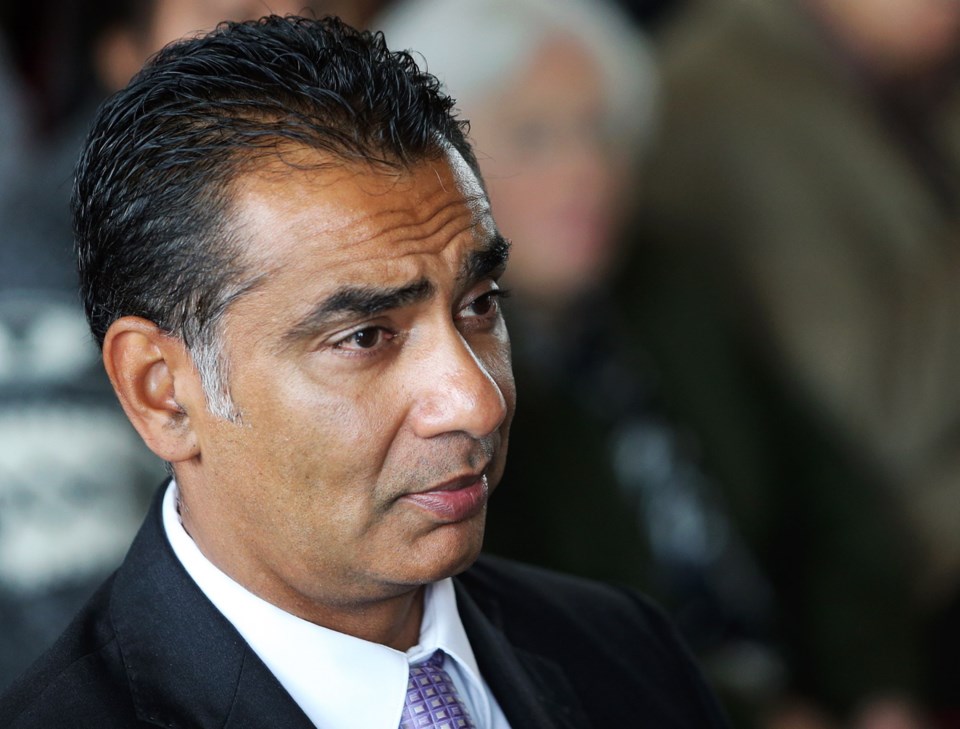 Advanced Education Minister Amrik Virk had a chance to move past the embarrassing revelations this week about how he bypassed the disclosure and compensation rules as a university board member a few years ago.
Advanced Education Minister Amrik Virk had a chance to move past the embarrassing revelations this week about how he bypassed the disclosure and compensation rules as a university board member a few years ago.
He didn’t quite make it.
The retired Mountie could have ’fessed up, acknowledged a lapse in judgment and said sorry. He made an effort in that regard, saying the issue was “humbling” and he could have done better. But then he veered off in the direction of larding the blame elsewhere.
“In some ways I feel a little bit let down that I didn’t have the fullest of information at hand, or the fullest training.”
There’s at least one email suggesting that’s a cop-out (excuse me).
Virk was named to the board of Kwantlen Polytechnic University in Surrey in 2008 and was put on the committee dealing with recruiting new executives. In at least two cases — and possibly more — the university finagled its way around strict rules about how much they could pay new executives, and equally strict rules about fully disclosing how much they were paying.
Virk went on to win the Surrey-Tynehead riding for the B.C. Liberals and was named advanced education minister last summer.
The NDP Opposition got wind of the cases and started pestering Virk over the course of the last legislative sitting. He was noticeably disdainful of the questions and never bothered fully answering any of them.
But Finance Minister Mike de Jong recognizes a problem when he sees it. It looked like the minister responsible for post-secondary education had a blot on his record from his earlier days in the same sector. So he had the issue checked out by an assistant deputy minister. The report establishes the university broke the rules and Virk was close at hand while the guidelines were being circumvented.
It was 2011 when Kwantlen was looking for a new president, had a candidate and felt the need to offer him a lot more money than was allowed under the guidelines. The board — with Virk as vice-chairman — contemplated using $100,000 from the university’s foundation to sweeten the pot.
The finance department wrote to the B.C. Association of Institutes and Universities inquiring how that idea would go over. It’s an independent organization that advises some postsecondary institutions on policy and government relations.
President Ruth Wittenberg wrote back with an emphatic warning against doing any such thing. She told Kwantlen it would bring an “extremely negative reaction from the government.
“It is highly likely that a move like the one being considered would result in the removal of the board chair, and also any other appointed members of the board.”
Spelling it out in some detail, she told Kwantlen that they are “obliged to conduct themselves within the government’s fiscal and operational framework.” To be clear, she advised that they must “seek approval for compensation proposals.”
And to be abundantly clear, she said: “I strongly recommend that your board chair not proceed down the path of compensation outside the guidelines. It will not work out well, that I can guarantee.”
It’s believed that email was forwarded to the board chair, and that the board chair forwarded it to Virk.
Nonetheless, the board cooked up a $50,000 signing bonus for the new president and called it a pre-employment contract. And when Virk submitted the paperwork to the government, the signing bonus was not included.
That was four months after he presumably read a clear warning from an outfit with long experience in the field that all the rules needed to be followed, and that there was no room to play fast and loose.
So his view — expressed twice this week — that he “feels let down that he didn’t have the fullest information” rings hollow.
Considering that he wound up as minister responsible for all the rules that his board and his committee flouted, he’d be much better off sticking to contrition, rather than complaining about how he was briefed.
Just So You Know: The biggest consequence of the whole issue is that postsecondary executives will have to take an annual, mandatory one-day course in reporting and disclosing salaries. You have to wonder whether the minister will audit the class.



